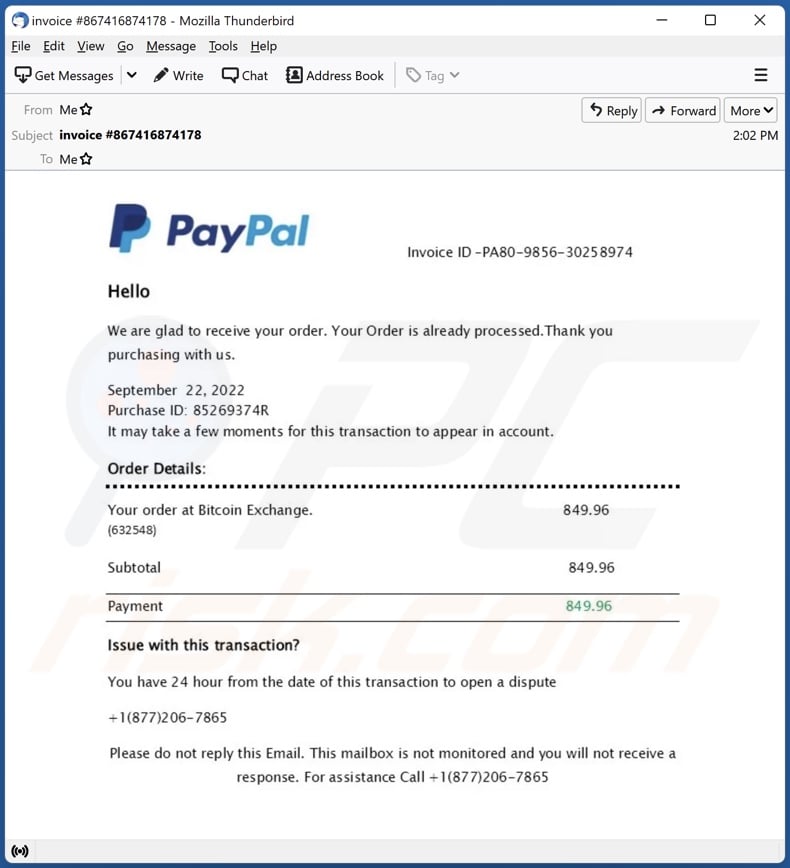Are you concerned about PayPal email scams? It’s important to be aware of potential scams that can target your PayPal account. By knowing the warning signs, you can protect yourself and your finances from malicious actors.
One of the most common scams is a fake PayPal email that looks like it’s from a legitimate company. These emails typically contain a link to a “secure” PayPal login page, but if you click on it, you’ll be taken to a fake site and your password will be stolen.
So how do you identify a real PayPal email? There are some telltale signs that should help you spot a scam.
First, look at who sent the email. A real PayPal email will come from “paypal.com” and will address you using your first and last name or your business name. If the sender is anything else, such as “PayPal Service (zxk1942R3@gmail.com)”, then it is not from PayPal and should be ignored or deleted immediately.
Second, pay attention to any links in the email body or in attachments. If an email contains links, make sure they go directly to “paypal.com” before clicking on them; if they don’t go there, don’t click on them! You should also avoid opening any attachments in suspicious emails as they may contain malicious software that can steal your information or damage your computer or device.
Finally, keep in mind that PayPal will never ask for sensitive information such as account numbers, Social Security numbers, or bank account details via email- so if an email asks for this information, delete it immediately!
By following these simple tips and being aware of potential scams targeting PayPal accounts, you can help protect yourself and your finances from malicious actors online!

The Dangers of PayPal Email Scams
Yes, there is a PayPal email scam going around. It involves fraudsters sending fake emails that look like legitimate password change emails from PayPal. The email includes a link to “secure” your PayPal account, but if you click on the link, you’ll be taken to a fake PayPal login page that steals your password. This type of scam is called phishing, and it’s important to be aware of it so you can protect yourself from becoming a victim. If you ever receive an email from PayPal that seems suspicious, it’s best not to click any links or reply to the message – instead, go directly to the official PayPal website and log in there.
Verifying the Authenticity of a PayPal Email
To know if a PayPal email is real, you should look for several key pieces of information. First, the email should come from an email address at paypal.com. Second, it should address you by your first and last name or business name. Third, the content of the email should be written in an informative tone and provide detailed information about the transaction or service being offered. Finally, if you have any doubts, you can always call PayPal directly to confirm that the email is legitimate.
Identifying PayPal Scammers
PayPal scams can be difficult to identify, but there are a few key signs to look out for.
First, be wary of any emails claiming to be from PayPal that don’t come from an address ending in “paypal.com”. Scammers often use other email addresses such as “customerservice@paypal.com” or “security@paypal.com” to try and trick you into providing personal information or clicking on dangerous links.
Second, PayPal will always address you by your full name or business name in emails and will never ask for your full bank account details or credit card numbers via email. If the email does not include your name, it may be a scam.
Third, never click on any links from an email that claims to be from PayPal unless you have verified the source is trustworthy. Some scammers will send malicious links in emails with fake PayPal logos that can install malware on your computer if clicked or take you to a bogus website where they try to get you to enter personal information such as passwords or bank account details.
Finally, if something looks suspicious, contact PayPal directly through their official website instead of responding directly to any suspicious emails and verify the request before taking any action.
Identifying Fake PayPal Emails
Fake emails from PayPal may look legitimate at first glance, but there are some tell-tale signs that can help you identify them. These include typos and grammar errors, odd punctuation, and extra spaces, as well as coming from what looks like a legitimate PayPal service email address. It’s important to be aware of these warning signs so that you can protect yourself from phishing scams. Remember to always check for any suspicious activity in your emails, such as strange content or requests for personal information. If an email looks suspicious or too good to be true, it’s best to delete it without responding.
Identifying Spam Emails from PayPal
Spam emails from PayPal often appear to be legitimate requests for information or notifications of suspicious activity. They may include a link or attachment, and they usually contain language that is overly formal, aggressive, or threatening. Common signs of a fake PayPal email include impersonal greetings (such as “Dear user”), requests for personal information, misspellings or grammatical errors, generic-looking logos and graphics, and links to websites that are not associated with PayPal. Additionally, any email claiming to be from PayPal should address the recipient by their full name as it appears in their PayPal account.
Conclusion
In conclusion, it is important to be aware of PayPal email scams and take the necessary steps to ensure your safety. To identify real PayPal emails, look for emails that come from paypal.com, use your first and last name or business name in the address, and don’t click any suspicious links. If you receive an email from a suspicious sender like “PayPal Service (zxk1942R3@gmail.com)”, it is best to delete the email immediately and contact PayPal directly for further assistance. If you follow these tips, you can help protect yourself from becoming a victim of PayPal scams.








